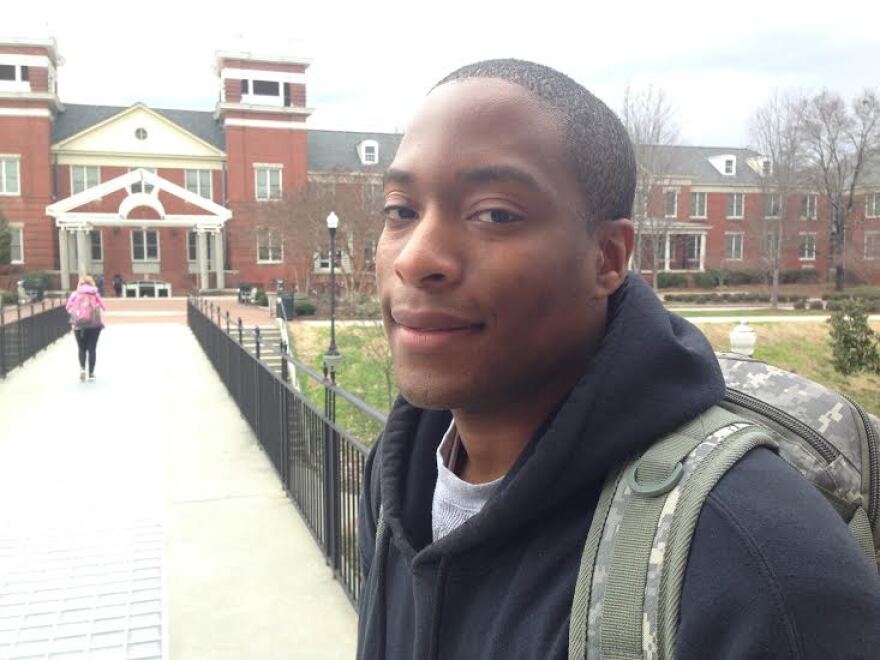The path from cradle to college and career has been especially hard for young Black men. Nationally, Black males have a lower high school graduation rate than White males and Hispanic males.
In rural communities, which have had fewer options for specialized attention at school along with shrinking job options, Black boys have struggled.
In our series, Perils & Promise: Educating North Carolina's Rural Students, we have introduced you to several young Black men in Vance County, like 18-year-old Markel Cozart.
“Fighting, tearing stuff up. I had a bad attitude problem. I still got one, but it’s not as bad as it used to be. I’ve calmed down a lot," said Cozart, explaining why he is now at Western Vance High School.
Cozart is set to graduate this spring from Western Vance High School—a second chance school for those who were kicked out of their traditional high schools.
"I just be focused on school, trying to do better," said Cozart. "Trying to make my Mama proud."
Cozart was kicked out of Northern Vance High School. That’s where DaJohn Henderson is a senior. Nice kid, good grades. We asked him what he was going to do after graduation.
"I really don’t know. I thought about Aerospace Engineering or Dentistry. Mostly those two," said Henderson, sitting his in AP Statistics classroom.
Henderson says he’s thinking about Vance Granville Community College until he figures things out. In a way, if both of these young men cross the graduation stage in June they’ve accomplished a great feat.
In Vance County, Black males lead the way in school suspensions and in dropping out of high school. And state numbers show only 21.7 percent are considered “college and career” ready. It’s a national problem. There’s even a White House initiative called “My Brother’s Keeper” to encourage communities to work specifically with males of color so they can reach their full potential.
Dimitri Yancey of Henderson remembers when he was in the 8th grade. He made all "A’s." An older cousin used to pay him $5 per A. And then he toured Northern Vance High School, preparing for freshman year. He did not like his first impression.
“As soon as we walked in, I smelled cigarette smoke and I was like, 'are they smoking in the bathrooms?'” said Yancey.
Yancey says his tour went downhill from there.
“I think a fight broke out, we weren’t nowhere near it, but could hear like all the commotion and see security trying to break it up. And I was like, I don’t think I’m equipped for this type of environment," said Yancey.
So Yancey says he begged his mother for a different environment, a college prep environment. Yancey would get up at 5:00 in the morning for the next four years to catch a bus to KIPP Pride High School in Gaston, North Carolina. The school is three counties away, in Northampton County.
KIPP, which stands for Knowledge is Power Program, is a network of national charter schools built strategically in underserved communities. They’ve been called influential and revolutionary. And their numbers show: 83 percent of “KIPPStars” go to college and are supported throughout.
Today, Yancey is 23-years-old and sitting in one of his favorite classes at the University of North Carolina Greensboro: Psychological Perspectives on Personal Relationships.
He’s set to graduate with his Bachelor’s degree this semester.
Yancey’s decision to leave Vance County Schools was at a pivotal time in the district’s development. In 2007 when he started 9th grade, there was no Fire and Public Safety Academy or the new Medical Academy to help students shape their career options early. And Early College was not available either.
“I really believe if they had Early College, I would have changed my whole course. I probably would have did that," said Yancey.
But Early College, the STEM program for select middle school students and the two academies were slow to materialize, too slow for Yancey.
“I am a believer that we need to start earlier because careers are about the prepared, not the entitled," said Anthony Jackson, Vance County’s new schools superintendent. Jackson, who is African American, has been open about growing up in the projects of Washington, DC and the opportunities that passed him by.
He recently presented his 90 Day Entry Plan to the district, outlining the good and the not so good things he’s seen during his first months on the job.
Jackson says school board policies are outdated and need immediate attention, especially when it comes to personnel and school discipline.
And one of his strategic priorities is Improved Equity and Access to College and Career Opportunities, which has been on his mind since taking the Vance County job.
“My concern is for the world of work we’ve got to think broader than just Vance County. We’re 45 minutes from Research Triangle Park, why aren’t we leveraging that," said Jackson.
Jackson also lists cultivating a “Culture of Excellence” as a priority.
Yancey says if he could change something about his old school district, it would be to develop a strong, clear message of excellence, and that everyone can succeed. Yancey plans on using his Psychology Degree to be a high school counselor.
"Because some students might not feel comfortable talking to their teachers, or the principal. But I always want to be that person that like, people can talk to. If they need somebody to hear problems or give advice I want to be that person," said Yancey.
Ironically, that could mean returning home and working at Northern Vance High School, the school he chose not to attend.
"Wherever my path chooses me to go, I’ll go," said Yancey, with a smile.










